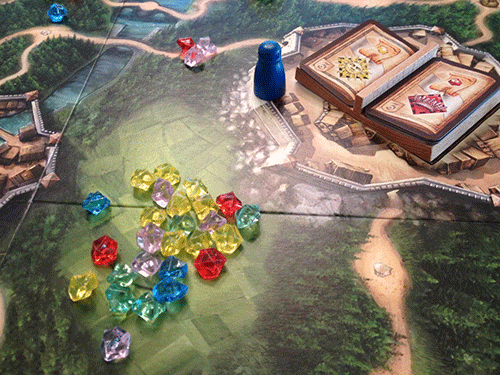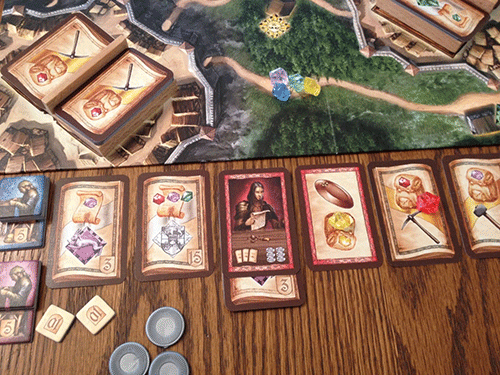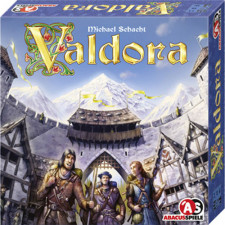Valdora Review
on Aug 17, 2016
The seeds our tabletop’s current Golden Age were sown in 1995 with the release of a little title from Germany, Settlers of Catan. Thus the Eurogame was unleashed upon the rest of the world. While it can be problematic to lump thousands of such titles together – and they vary in complexity – Valdora nonetheless proved the genre was still bearing bountiful fruit fifteen years later.

From veteran and award-winning designer Michael Schacht, Valdora bears enough Eurogame DNA that lab testing would assert its paternal heritage to that evergreen classic – known today simply as Catan. Dominant amongst its genes are a clean and simple rules set accessible to a broad range of experiences. Success requires smart and efficient planning, without overtaxing players. Which means it is well suited to both competitive and social play. Randomness influences strategy, but not detrimentally. Player interaction amounts to racing and beating others to resources, so it’s impactful, but never nasty. Finally, the game clocks in at around a satisfying hour – a rewarding guest that also respects its host's time.
Alas, all of that comes at the expense of a captivating story or theme. Setting doesn't cogently inform game play, but rather serve as backdrop to the mechanisms on center stage. Even if the rules are innovative, strong or easily accommodating, they often run players through rote routine with little logic to any narrative. This Eurogame stamp is particularly glaring in Valdora. The setting is so generic it’s lithely referred to as a place “hidden far away from our time†and “full of unimaginable riches.†Indeed gems and silver are lying about all over the place just waiting for you to wander by. As an adventurer seeking fortune your goal is to pick up jewels and deliver them to similarly colored patrons who will pay in that currency so dearly treasured by Eurogamers – victory points.
This is a Eurogame, so you’re not a cutthroat adventurer. Whenever you land on a space occupied by another, you’ll pay her a coin for the intrusion. When visiting a silver mine the money’s free, but you’ll only refill your pockets to six coins. Our present non-hidden world could do with such honesty! You’re also not the type to greedily shove all the gemstones from one space into your knapsack. Instead, you’ll only grab a colored gem appropriately matching the proper tool, which you can acquire for gold in two of the realm’s four cities. Each piece of equipment allows you to extract one type of gem and only carry one at a time.
The other two cities provide commissions which you can purchase for coins. These contracts specify colored gems which you must deliver to their corresponding patron houses around the board. You’ll earn points for completing the order and gain a craftsman each time. These don’t actually craft anything except more points. The more you have, the more crafty they are. Whenever you deliver a pretty rock, it is discarded to a vast field in the middle of the board. There they lie where anyone can grab one, again with the right tool, by visiting one of the land’s three harbors. This recycling center assures the game never runs out of resources.
Equipment and commissions are displayed on the game’s famous centerpieces – books. Cards are laid in the wooden blocks like pages. You can turn a page for free when shopping and pay coins to keep flipping until you find something you like. Those catalogs and the gems make Valdora look colorfully sharp and eye-catching. However, the mechanism looks and sounds cleverer than it operates in actual practice.
Players travel about this hidden and eco-friendly land buying gear, committing contracts, picking up jewels and delivering them until feeling independent and carefree. Indeed you may even start singing Dion’s 1961 hit The Wanderer in your head (or out loud) while skittering along the roads from city to harbor to mine to patron. You’re the type of guy that likes to roam around. Where pretty gems are, well, you know that you’re around. You roam around, around, around. Both thematically and titularly appropriate as Valdora and Dion are equally mononymous.

There’s little interaction. You’ll typically eschew landing on occupied spaces to avoid paying others a toll, because you can easily do so and still accomplishing what you want. Someone might beat you to a convenient gem, desired tool or juicy commission. But it rarely puts you out because there are plenty more of everything lying around and enough swag for everybody. Land of unimaginable riches means no shortages.
With few obstacles and plenty resources Valdora comes down to sheer optimization – and it shines as light, puzzle-like pick up and deliver fare. While there are multiple locations, travel is restricted by city so that you can’t transport just anywhere in one turn. You must plan your route carefully making sure you have the right tool to pick up the right jewel in the right place. Whoever manages that most efficiently will rake in gems – and victory points. Its attractiveness lures casual players, its accessibility engages them, its strategy rewards them and its brisk pace satisfies them. So if you’ve got a “Eurogamer†on your chest you can roam from town to town, because in Valdora you’ve got two fists of gems and are as happy as a clown.

 Customer Support
Customer Support  Subscribe
Subscribe 




 Account
Account  Wishlist
Wishlist 

